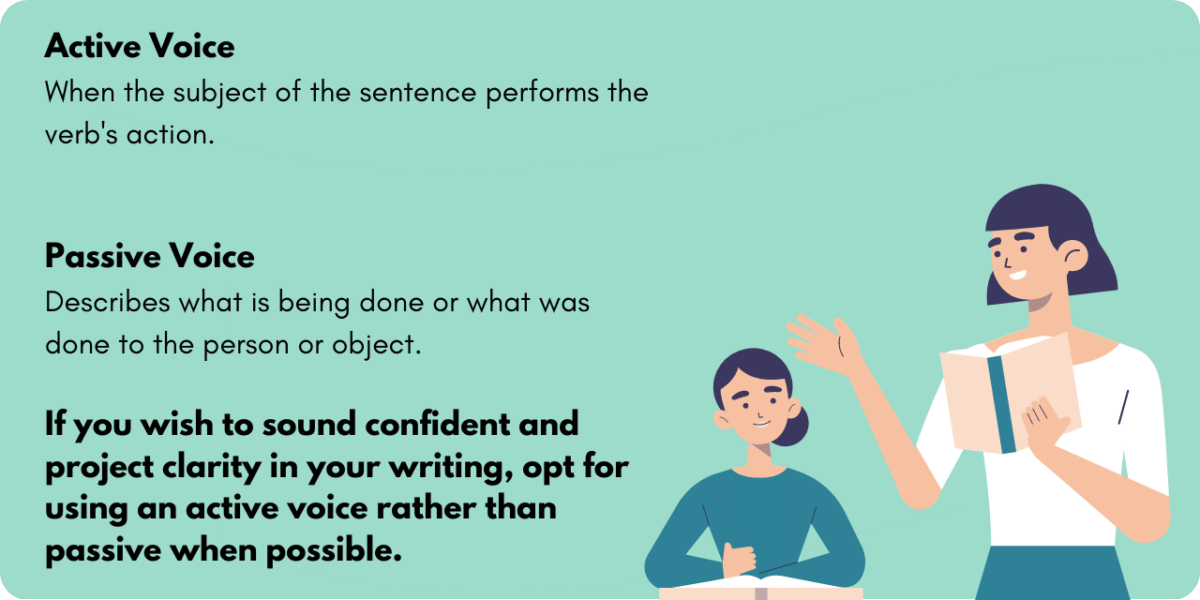People love to tell others what to do with their voice: “Lower your voice,” or “Save your voice.” And one suggestion that causes a lot of confusion is: “When faced with active voice vs. passive voice in your writing, use your active voice when possible.”
My active voice? Not my passive voice? I thought I only had one voice…
In writing, there are two grammatical voices—active voice and passive voice. And you may have been warned by your well-meaning English teacher to avoid passive voice like the plague. But both voices have a right to be heard. However, one will definitely trump the other in helping you become more adept at business writing.
Active Voice vs. Passive Voice
If you’ve used Grammarly or Microsoft Word to edit your documents, you’ve probably been chastised on multiple occasions to use less passive voice. MS Word will even underline the sentence in squiggly red (the scary color editors use to invoke fear in a writer). If you don’t have a proper understanding of what active voice and passive voice mean, you may have clicked “Dismiss” and ignored it.
Both are grammatically correct—it’s not a mortal sin to use passive voice. But the style you choose will have a dramatic impact on your writing. And how your message is received. Therefore, it’s important to have a clear understanding of how the two differ.

What is Active Voice?
Active voice is when the subject of a sentence performs the verb’s action. In other words, it tells what a person or thing does. The sentence is direct, strong, and easy to read. For example:
- Horses love oats.
- The police chased the robber.
- Our business strategy expanded the network in two years.
In each of these examples, the active voice put the subject first. Next, the subject performs the action that the rest of the sentence explains. Active voice is enhanced when you add action verbs (e.g., climb, ask, make). Action verbs express what a person or object can do (e.g., read, smile, bake).
What is Passive Voice?
Passive voice tells what is being done or was done to the person or object. It is often made up of a form of the verb “to be.” It may use the past participle of a verb (e.g., is enjoyed, was eaten, were chosen). The sentences below are all written in the passive voice:
- Oats are loved by horses.
- The robber was chased by the police.
- The network was expanded in two years.
Passive voice tends to be more prolonged and even tedious to read. You may waste words (and time) in getting to your point. Or it may make your writing sound impersonal.
Passive Voice in Business Writing
Passive voice has its place in writing. This is especially true in more formal settings such as legal. Or when presenting scientific statements. And what if you are reporting on an event, but you are unsure who performed the action? For example:
- The gate was crashed down again.
In this case, the passive construction indicates that you do not know who the culprit is (e.g., a bad driver, a cow with a grudge). Or you may use passive voice to direct the attention away from or change who or what the subject of the sentence is. In this example, the focus is on what happened to the gate, not who crashed through it.
Active Voice in Business Writing
Active voice is a way to take control of your writing. When you sound confident, your reader or audience is more likely to trust what you have to say. Passive voice often makes the writer appear unsure. So, if you want to present a solid argument and influence your reader, learn to use active voice in your business writing.
Another benefit to writing in active voice is that your sentences will be easier to read and understand. Active voice emphasizes the subject. It clears up any misconceptions about who or what was at fault or performed the action. For example:
- I made a mistake in tabulating the sales for the third quarter.
- The teller approached the man in the bank.
There is no question about who made the mistake or who approached the man. Passive voice would have removed the clarity. For example:
- A mistake was made in tabulating sales for the third quarter.
- The man was approached in the bank.
How to Use Active Voice
As you proof your writing, identify sentences written in the passive voice. Change the composition to create an active voice. Your goal is to make it clear in your reader’s mind who is performing the action. Like this:
Passive: The job offer was accepted by Matt.
Active: Matt accepted the job offer.
Passive: An investigation will be conducted.
Active: The HR officer will conduct the investigation.
Passive: The memo was read by the supervisor and the employees were asked questions.
Active: The supervisor read the memo and asked the employees questions.
It may take a little extra time in editing your documents in this manner. But the exercise will help you quickly identify passive voice and train your brain to formulate active voice sentence structure.
Your goal is to become a better writer and excel at business communication. Using passive voice sparingly and active voice generously will help you to do so.
The Takeaway
Active voice is when the subject performs the action, while passive voice details what is happening or what happened to the subject. If you wish to sound confident and project clarity in your writing, opt for using an active voice rather than passive when possible.
Quiz
Now it’s time to put your new-found knowledge into action. Re-write the sentences below using an active voice:
- The offer was accepted by Joyce.
- The merger will certainly be welcomed by the stockholders.
- Matt was asked by upper management to assist with the project.
- The memo was written by the company’s CEO.
- The project was completed by the team last week.
Here are the answers:
- Joyce accepted the offer
- The stockholders will certainly welcome the merger.
- Upper management asked Matt to assist with the project.
- The company’s CEO wrote the memo
- The team completed the project last week.






